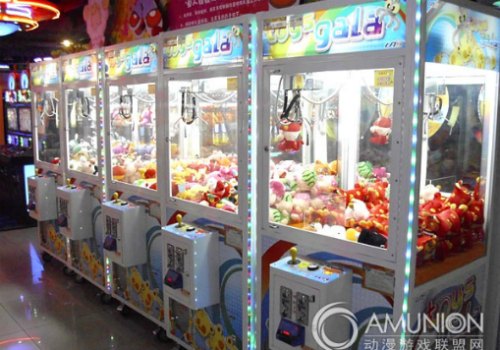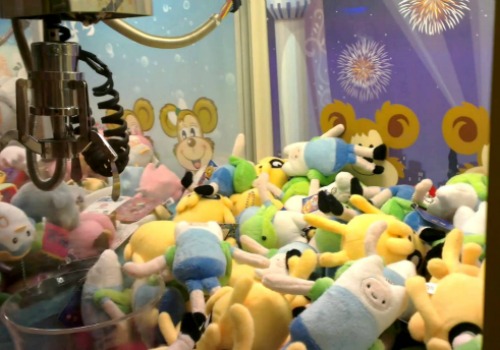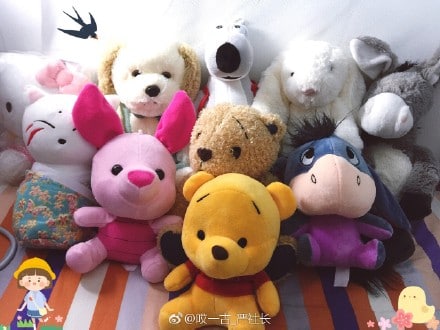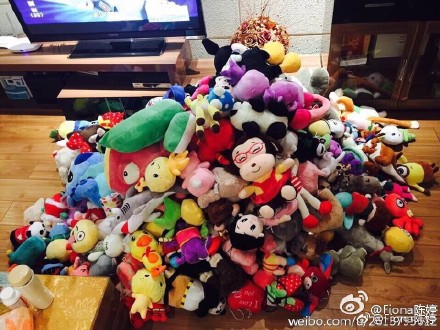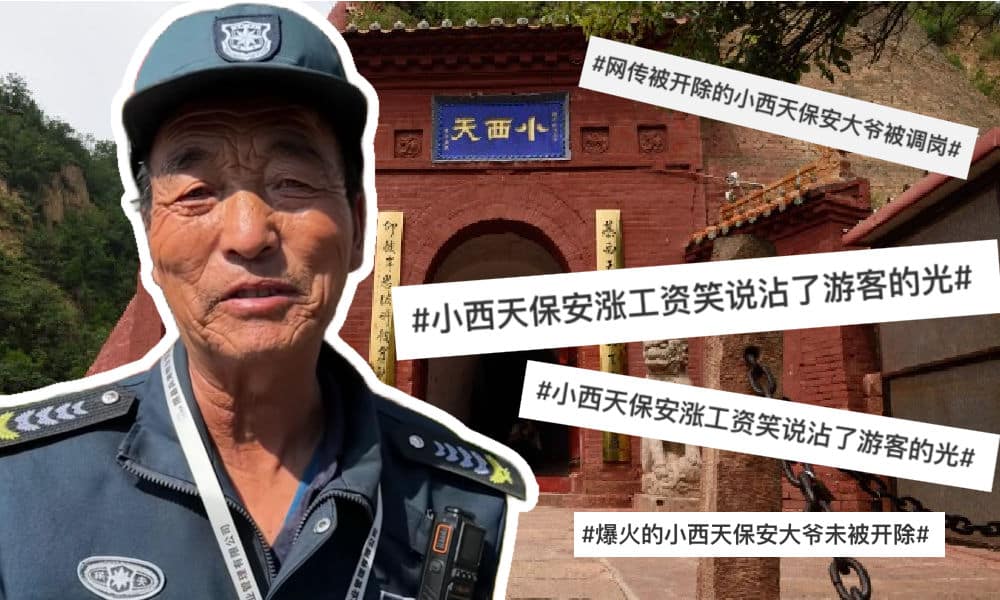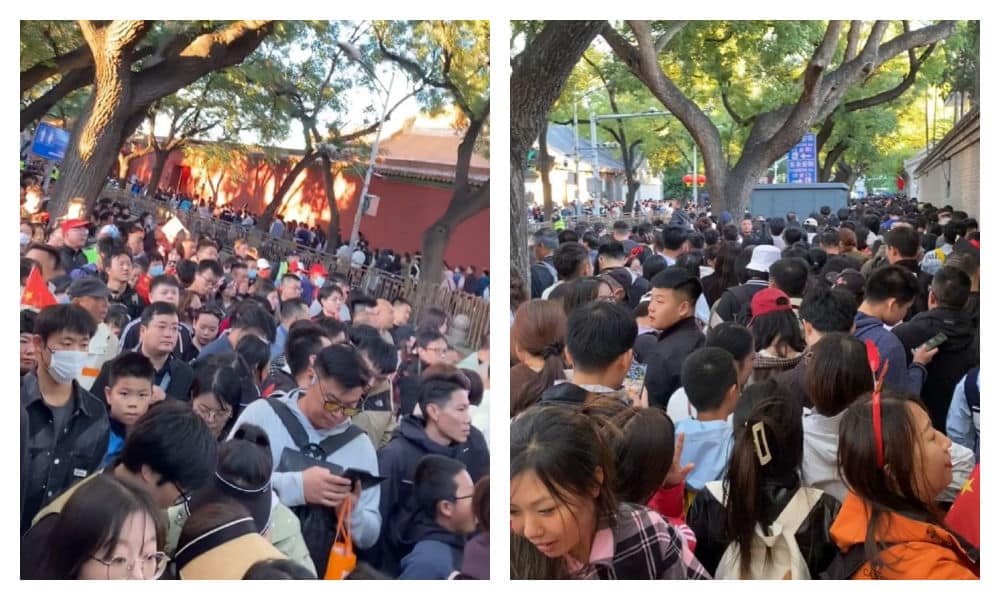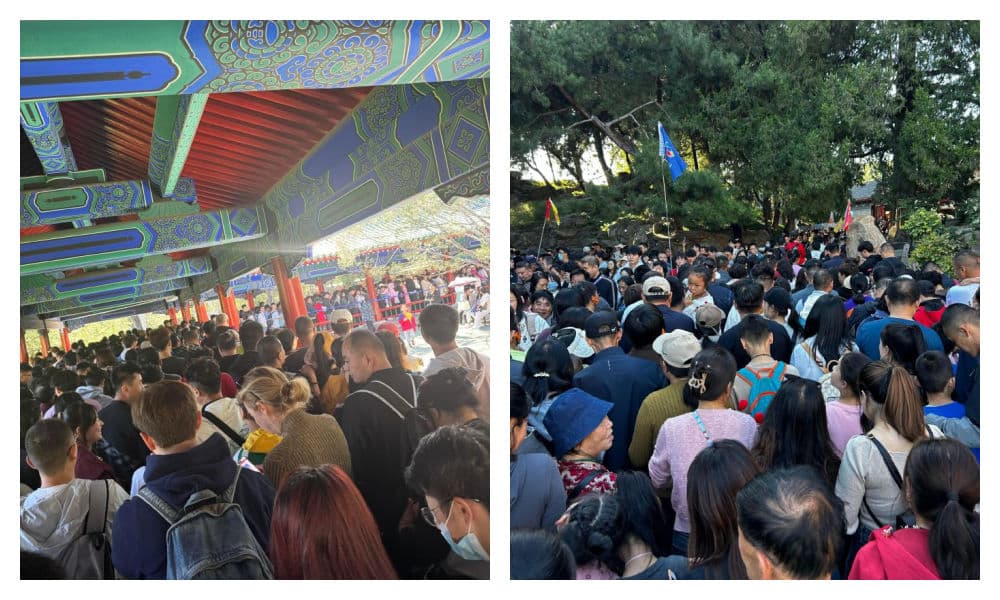An elderly man with a friendly face from Shanxi Province’s Xi County became China’s most famous security guard this week. After first receiving a raise and then seemingly being fired from his job, the situation sparked so much discussion that it became a top trending topic on Weibo.
The man in question is a bǎo’ān (保安, security guard) at the Xiaoxitian (小西天) temple complex area in Xi County in the city of Linfen. That area has recently became a hot destination among domestic travelers because of the wildly popular video game Black Myth: Wukong. The game, inspired by the classic novel Journey to the West, features numerous real-life landmarks from Shanxi province.
As a so-called “Wukong site,” Xiaoxitian, among with dozens of other spots in Shanxi, has seen a surge in visitors, including gaming bloggers, travel vloggers, and online influencers.
One of these influencers is the Douyin vlogger “So Many Times” (@那么多曾经), who has been documenting the success of Xiaoxitian on her channel. The vlogger, who now has 12,000 fans, has been capturing the rising number of visitors to the area, especially during this year’s National Day holiday.
Her videos often focus on the best times to visit without having to queue, traffic updates, and daily visitor counts. In one video, she even captured the first group of foreign tourists visiting the area.
“They gave me a raise”
Recently, the vlogger also featured some of the security guards at Xiaoxitian, chatting with them about their local dialect, their work, and how they manage the crowds.
In the videos by “So Many Times,” the vlogger focused on one particular security guard—an elderly bao’an who was especially friendly to her. In several videos, he shared how much he enjoyed his job and the increasing responsibilities that came with Xiaoxitian’s growing popularity. He soon became affectionately known among visitors as the “Security Guard Uncle” (保安大叔).

The security guard became popular online due to videos posted by a Douyin vlogger.
In a video posted on October 15, the bao’an happily shared how grateful he was for the visitors. Smiling, he said, “I attended a meeting, and they gave me a raise. I used to earn 1,700 yuan (US$240) a month, and they added 500 yuan (US$70), so now it’s 2,100 (he meant 2,200 yuan/US$310). Everyone’s salary went up.” (See video here)
The security guard suggested the tourists were to be thanked for local bao’an getting a better pay, as it increased their workload.
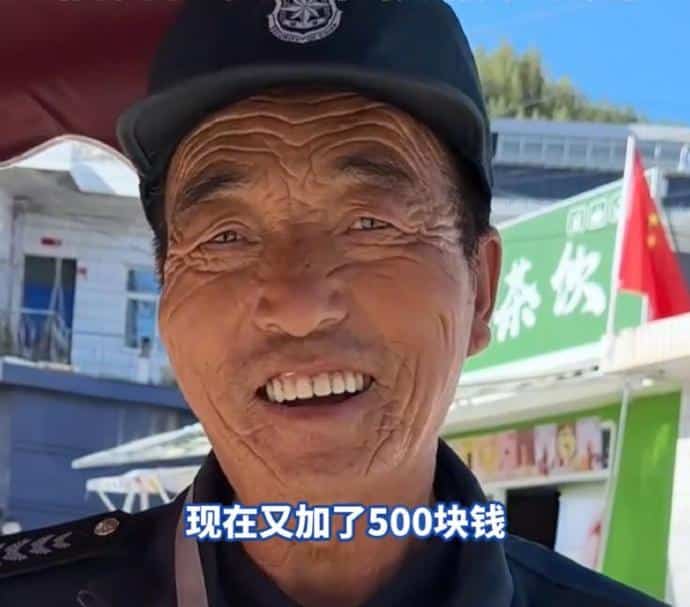
Uncle Bao’an tells about his 500 yuan raise.
The video quickly went viral—becoming the most-watched on the vlogger’s channel—as some viewers appreciated how ‘influencer tourism’ can benefit local workers. Others, however, were surprised by the 1,700 yuan/month (US$240) salary, considering it far too low. Beyond these discussions, the uncle’s friendly demeanor, humble enthusiasm, and obvious passion for his work touched many hearts.
A news reporter for Jimu News verified with the local citizen hotline that the minimum monthly wage in Xi County is 1,780 yuan ($250), and that the 1,700 yuan salary previously mentioned by the security guard was below this standard.
A few days later, on October 19, the Douyin vlogger whose videos made ‘Uncle Bao’an’ famous posted another short video (which has since been taken down). In this video, the security guard looked tired and said, “They [the superiors] told me not to work anymore. I didn’t say anything wrong, but they don’t want me to continue.”
He explained that his leaders thought it was inappropriate for him to appear in the other videos, though he felt it was spreading positive energy.
“These past few days, I haven’t been feeling well. They don’t want me to work, and I’m very sad.. I will never forget everyone’s support.”
“He didn’t hear it clearly”
News of the popular security guard’s alleged dismissal flooded the internet, becoming one of the hottest topics on Weibo.
Many netizens were outraged, feeling that the bao’an was unfairly forced to stop doing his job. They suggested he was dismissed because he disclosed information about his pay and the recent raise.
In light of the online controversy, the local tourism authorities responded to clarify the situation on October 20.
A spokesperson from Linfen suggested that the bao’an had not heard it clearly (“他就没听清楚”), and was not dismissed at all. Instead, he was simply given a few days off and “reassigned to a less demanding role” to lighten his workload, considering his age and the fact that he had been working without a break for the past two months.
“We all heard it clearly”
On social media, most netizens aren’t buying the story about the bao’an allegedly “misunderstanding” his dismissal.
“Do they think we’re fools? Do they think we haven’t all seen the video on the 19th?” one commenter wrote.
“Ha ha ha, if this hadn’t blown up online, he would have been fired. But because it went viral, now he’s ‘transferred to another post,’” another Weibo user remarked.
“We all heard it clearly,” another blogger added.

“Okay” / “Sure” – a meme posted by netizens after hearing about the security guard allegedly “misunderstanding” his dismissal.
People suspected that the security guard was initially fired—possibly for speaking about his low income or because he was becoming a tourist attraction himself—but the decision was reversed after it sparked public outrage online. Rather than offering an apology, the authorities then claimed it was all just a misunderstanding.
In light of the controversy and worried over the bao’an’s well-being, other Douyin users visiting Xiaoxitian began searching for the popular security guard and filmed themselves finding him at a different location. In one such video, ‘Uncle Bao’an’ confirmed that his superiors had reassigned him to lighten his workload. Some viewers commented that he didn’t seem as happy as before.
However, in the latest video by “So Many Times” (@那么多曾经), the vlogger once again features her favorite bao’an. (She used a new account for this, as her original account was restricted from posting new videos). In the video, he expresses his gratitude and happiness for the overwhelming support he has received.
“I want to thank all of you online friends for your support and your concern for me. It makes me very happy. Thank you. so many people wanted to take a picture with me today. People from Henan, from Sichuan. So many people wanted to shake my hand.”
Despite the controversy, the bao’an seems quite pleased with his sudden fame. If he does end up losing his job after all, he could always launch a new career as an online influencer.
By Manya Koetse
(follow on X, LinkedIn, or Instagram)
Spotted a mistake or want to add something? Please let us know in comments below or email us. First-time commenters, please be patient – we will have to manually approve your comment before it appears.
©2024 Whatsonweibo. All rights reserved. Do not reproduce our content without permission – you can contact us at info@whatsonweibo.com.
Follow What’s on Weibo on


 China Insight6 months ago
China Insight6 months ago
 China Music7 months ago
China Music7 months ago
 China Insight8 months ago
China Insight8 months ago
 China Insight11 months ago
China Insight11 months ago
